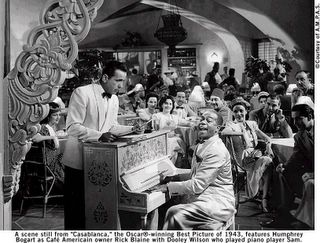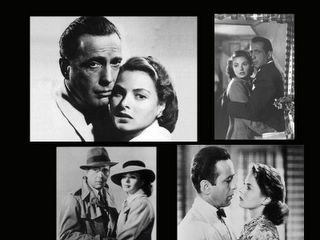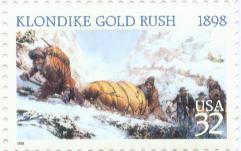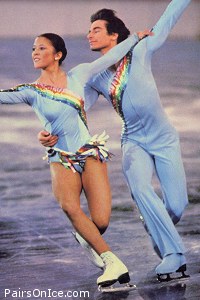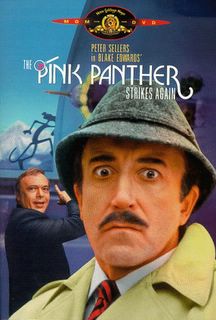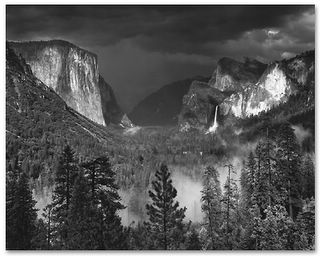A little bit of everything and a lot of nothing: images and stories to take us on an eclectic journey. . . . . . CLICK ON THE HEADING FOR THE "SOURCE" OF THE ARTICLE AND CLICK ON THE LINK BELOW FOR PHOTOGRAPHER. CLICK ON IMAGES FOR A LARGER VERSION.
Monday, May 30, 2005
Why some people just don't get it
Scientists have discovered comedy central in the brain--specific tissue regulating the ability to understand sarcasm. In sarcasm, the literal meaning is different from the true meaning, and some people just don't understand that difference. Sarcasm is used in social situations as an indirect way of expressing criticism. The network that regulates one's ability to appreciate sarcasm begins with an understanding of the meaning of the sentence, which is carried out by the left frontal lobe. Then the right frontal lobe helps put it into a social context. Finally the right frontal lobe must be able to differentiate between the literal meaning and what is really meant. People with damage to the right frontal lobe, right behind the eyes, are unable to appreciate this kind of humor. Perhaps even subtle differences in the "wiring" of this region can leave people unable to empathize, and it is this lack of ascertaining another's emotional state that may be responsible for the inability to understand sarcasm.
Magnesium may help lower blood pressure, and may help prevent diabetes
Magnesium is sometimes called "nature's calcium channel blocker" because like that class of heart drugs, the mineral blocks calcium from entering cells, relaxing blood vessels and lowering blood pressure. The mineral is abundant in dark leafy greens, such as spinach, and in nuts, whole grains and beans. Most doctors--and the government--recommend 400 milligrams a day. Many people in the U.S. get less than 200 milligrams a day.
Sunday, May 29, 2005
"Da Vinci Code" to be filmed at the LOUVRE
Scenes for the bestselling novel "The Da Vinci Code" are to be shot on location at the Louvre, the famed museum in Paris. Filming is expected to start in June with Oscar-winner Ron Howard directing. Tom Hanks, also an Oscar winner will play Robert Langdon, a symbologist in a race to solve the murder of an elderly member of an ancient society that has protected dark secrets since the early years of Christianity. "The Da Vinci Code" is a mix of code breaking, art history, secret societies, religion and lore. Several other books question its contentious allegations--including that Jesus married Mary Magdalene and sired a bloodline.
Friday, May 27, 2005
WHY IS IT THAT CUBS FANS ARE EVERYWHERE ??
I grew up in Illinois rooting for the Cubs. However, I've now lived in Southern California for many, many years . . . but I've never stopped rooting for the Cubs. One thing I've always been curious about is their popularity. This popularity has deep roots and continues in spite of many, many losing seasons. Attendance figures for the individual teams are quite revealing. At home the Cubs are limited by the friendly confines of Wrigley Field which has a seating capacity that is rather small compared to the average for ballparks today. But on the road, the Cubs have always ranked near the top in their ability to draw large crowds. For the 2005 season through July 8, the Cubs drew an average of 37,502 fans on the road, tops in the National League by almost 3,000 fans. The only club to top this total was the Boston Red Sox in the American League. They averaged 39,364 fans on the road. I'm reminded of this pervasive popularity quite often. When I take my daily walk I usually wear my "Cubs" floppy hat. People recognize it everywhere and often make comments such as: "How about those Cubbies" or "How'd they do today, did they win?" I sometimes wonder what it would be like if I wore my "Cubs" baseball Cap which is even more easily recognized. One thing is clear to me, Cub Fans are everywhere. For a "tongue in cheek" tribute to the Cubs, visit Cubbyland (see link on sidebar).
Thursday, May 26, 2005
DISCOVER BRIDGE . . .
Like any game, bridge is more fun if you play it well. Over 200,000 U.S. bridge players have found that duplicate bridge is one of the best ways to improve their skills and enjoy playing their favorite game. These people compete in daily and weekly duplicate games -- some just for novices and newcomers -- held in virtually every city (and many small towns) in the country. Almost all of these club games are open to anyone who knows how to play beginning bridge.
What's different?
Duplicate bridge is not really a different form of the game than you've already learned. You still play "regular" bridge, but the final score on each hand is determined by a comparison method (called matchpoints) instead of just total points. It's called duplicate because each hand you play will be played at several other tables during the session, under the same conditions. Unlike rubber bridge, which depends heavily on being dealt good hands to win, your final score at duplicate depends only on how well you bid and play the cards you actually hold, not on how "good" those cards are.
What's different?
Duplicate bridge is not really a different form of the game than you've already learned. You still play "regular" bridge, but the final score on each hand is determined by a comparison method (called matchpoints) instead of just total points. It's called duplicate because each hand you play will be played at several other tables during the session, under the same conditions. Unlike rubber bridge, which depends heavily on being dealt good hands to win, your final score at duplicate depends only on how well you bid and play the cards you actually hold, not on how "good" those cards are.
Friday, May 20, 2005
Thursday, May 19, 2005
A KIND SOUL'S WAY OF CARING FOR SOME OF GOD'S WINGED CREATURES
Richard visits the Manhattan Beach pier daily to provide TLC for the pigeons, sea gulls and other winged creatures who inhabit the area. Using a simple plastic bottle, Richard pours water to make a puddle so that the birds can have a drink of fresh water. As he pours, many of his little friends take advantage of the opportunity to have a shower; some of them raising their little wings to wash their "wing pits" as they revel in this daily ritual. They know this man, and if Richard should be a little late for his appointment, his little friends will be waiting. Today some of them were perched on his arm and hand as he was opening the small packet of birdseed, but the birdseed is scattered over a wide area so that every bird is assured of getting their fair share. And when it's over, only a small puddle remains. You can witness this heart-warming event which takes place daily at the pier, usually just before noon. You'll know if you missed it because you'll see the puddle.
Wednesday, May 18, 2005
MOVIETALK: What made Casablanca great ?
This classic Hollywood melodrama of the forties was lucky on several counts. It nearly starred Ronald Reagan and Ann Sheridan instead of Humphrey Bogart and Ingrid Bergman. It happened to provide good parts for Sydney Greenstreet, Peter Lorre, S. Z. Sakall, and especially Claude Rains; its mood anticipated the film noirs which came full flood at war's end; it hit the news acidentally by being released shortly before the Casablanca conference; and almost as an afterthought it had Dooley Wilson singing "As Time Goes By." Of course, it didn't hurt that it had a tense and witty script and skilled direction as this comparatively modest professional spy thriller just happened to wrap up a whole era in an entertaining package.
Sunday, May 15, 2005
IS IT A HOAX ???
Interspersed among the junk mail and spam that fills our Internet e-mail boxes are dire warnings about devastating new viruses, Trojans that eat the heart out of your system, and malicious software that can steal the computer right off your desk. Added to that are messages about free money, children in trouble, and other items designed to grab you and get you to forward the message to everyone you know. Most all of these messages are hoaxes or chain letters. While hoaxes do not automatically infect systems like a virus or Trojan, they are still time consuming and costly to remove from all the systems where they exist. At HOAXBUSTERS, they say "We find that we spend much more time de-bunking hoaxes than handling real virus and Trojan incidents." Here's a website that describes some of the warnings, offers, and pleas for help that are filling our mailboxes, clogging our mailservers, and that generally do not have any basis in fact.
In addition to describing hoaxes and chain letters found on the Internet, this website discusses how to recognize hoaxes, what to do about them, and some of the history of hoaxes on the Internet.
Check it out at: http://hoaxbusters.ciac.org/
In addition to describing hoaxes and chain letters found on the Internet, this website discusses how to recognize hoaxes, what to do about them, and some of the history of hoaxes on the Internet.
Check it out at: http://hoaxbusters.ciac.org/
Saturday, May 14, 2005
AH . . . GOVERNMENT . .
Once upon a time the government had a vast scrap yard in the middle of a desert. Congress said, "Someone may steal from it at night." So they created a night watchman position and hired a person for the job.
Then Congress said, "How does the watchman do his job without instruction?" So they created a planning department and hired two people, one person to write the instructions, and one person to do time studies.
Then Congress said, "How will we know the night watchman is doing the tasks correctly?" So they created a Quality Control department and hired two people. One to do the studies and one to write the reports.
Then Congress said, "How are these people going to get paid?" So they created the following positions, a time keeper, and a payroll officer, then hired two people.
Then Congress said, "Who will be accountable for all of these people?" So they created an administrative section and hired three people, an Administrative Officer, Assistant Administrative Officer, and a Legal Secretary.
Then Congress said, "We have had this command in operation for one year and we are $18,000 over budget, we must cutback overall cost."
So they laid off the night watchman.
Then Congress said, "How does the watchman do his job without instruction?" So they created a planning department and hired two people, one person to write the instructions, and one person to do time studies.
Then Congress said, "How will we know the night watchman is doing the tasks correctly?" So they created a Quality Control department and hired two people. One to do the studies and one to write the reports.
Then Congress said, "How are these people going to get paid?" So they created the following positions, a time keeper, and a payroll officer, then hired two people.
Then Congress said, "Who will be accountable for all of these people?" So they created an administrative section and hired three people, an Administrative Officer, Assistant Administrative Officer, and a Legal Secretary.
Then Congress said, "We have had this command in operation for one year and we are $18,000 over budget, we must cutback overall cost."
So they laid off the night watchman.
HIGH ANXIETY . . . AND CHARACTERIZATIONS THAT LIVE ON
A hilarious Mel Brooks parody of the Alfred Hitchcock films that shows off the beautiful city of San Francisco and highlights the awe-inspiring Hyatt Regency Hotel. This film has unforgettable characterizations by Madeline Kahn, Cloris Leachman, Harvey Korman, Ron Carey, Rudy De Luca and Barry Levinson.
FILMED ON LOCATION . . . THIS IS WHERE IT HAPPENED . . . HIGH ANXIETY
Monday, May 09, 2005
YOU MUST BE . . .
A man in a hot air balloon realized he was lost. He reduced altitude and spotted a woman below. He descended a bit more and shouted, "Excuse me, can you help me? I promised a friend I would meet him an hour ago, but I don't know where I am."
The woman below replied, "You're in a hot air balloon hovering approximately 30 feet above the ground. You're between 40 and 41 degrees north latitude and between 59 and 60 degrees west longitude."
"You must be a teacher," said the balloonist.
"I am," replied the woman, "How did you know?"
"Well," answered the balloonist, "everything you told me is, technically correct, but I've no idea what to make of your information, and the fact is I'm still lost. Frankly, you've not been much help at all. If anything, you've delayed my trip."
The woman below responded, "You must be a School Administrator."
"I am," replied the balloonist, "but how did you know?"
"Well," said the woman, "you don't know where you are or where you're going. You have risen to where you are due to a large quantity of hot air. You made a promise, which you've no idea how to keep, and you expect people beneath you to solve your problems. The fact is you are in exactly the same position you were in before we met, but now, somehow, it's my fault."
The woman below replied, "You're in a hot air balloon hovering approximately 30 feet above the ground. You're between 40 and 41 degrees north latitude and between 59 and 60 degrees west longitude."
"You must be a teacher," said the balloonist.
"I am," replied the woman, "How did you know?"
"Well," answered the balloonist, "everything you told me is, technically correct, but I've no idea what to make of your information, and the fact is I'm still lost. Frankly, you've not been much help at all. If anything, you've delayed my trip."
The woman below responded, "You must be a School Administrator."
"I am," replied the balloonist, "but how did you know?"
"Well," said the woman, "you don't know where you are or where you're going. You have risen to where you are due to a large quantity of hot air. You made a promise, which you've no idea how to keep, and you expect people beneath you to solve your problems. The fact is you are in exactly the same position you were in before we met, but now, somehow, it's my fault."
Sunday, May 08, 2005
The Yukon Gold Rush of 1897 brought Soapy Smith to Skagway, Alaska. Before long Smith was the "boss" of Scagway. He moved from petty swindles and eventually controlled most of Skagway's darker vices. He opened a telegraph office and miners would come into the office to send messages to their families and friends, and a few hours later, back would come a telegraphed reply. This worked quite satisfactorily for all parties, apparently, despite the fact that there were no telegraph lines connecting Skagway to the outside world !!!
Still, Soapy sometimes had a generous nature and was known to give shelter and food to the penniless. It seemed that he sought the notoriety more than the money and his often swashbuckling manner made him an easy target for the reformers in a town with no law and little order. He ran the town with an iron hand for about a year before the citizens had enough and an uprising put an end to his rule. Soapy lost a gunfight and died on July, 8, 1898 at the age of 37. He's buried in an unmarked grave in a Scagway cemetery.
Still, Soapy sometimes had a generous nature and was known to give shelter and food to the penniless. It seemed that he sought the notoriety more than the money and his often swashbuckling manner made him an easy target for the reformers in a town with no law and little order. He ran the town with an iron hand for about a year before the citizens had enough and an uprising put an end to his rule. Soapy lost a gunfight and died on July, 8, 1898 at the age of 37. He's buried in an unmarked grave in a Scagway cemetery.
MURPHY'S LAW
Nothing is as easy as it looks.
Everything takes longer than you expect.
And if anything can go wrong . . . it will at the worst possible moment.
Everything takes longer than you expect.
And if anything can go wrong . . . it will at the worst possible moment.
Friday, May 06, 2005
Tai Babilonia and Randy Gardner won five consecutive U.S. amateur figure skating pairs titles from 1976 to 1980. In 1979, they won the world pairs championship with perfect scores. They were hyped as gold medal favorites at the 1980 Olympics, but Gardner aggravated a groin injury during warmups, forcing them to withdraw. The duo became forever known as the heartbreak kids of Lake Placid.
If you want the best (meaning funniest) of the Pink Panther films, check out THE PINK PANTHER STRIKES AGAIN (1976); the fifth in the series is probably the best of the lot. Peter Sellers keeps coming up with new ways to drive his boss (Herbert Lom) crazy with the usual number of pain-and-destruction jokes thrown in for good measure.
Thursday, May 05, 2005
BASEBALL TALK
Tinker to Evers to Chance
The Chicago Cubs double play combination from 1903-10 was immortalized in poem by New York sportswriter Franklin P. Adams—------SS Joe Tinker (1880-1948), 2B Johnny Evers (1883-1947) and 1B Frank Chance (1877-1924); All 3 managed the Cubs and later made the Hall of Fame.
This legendary poem pays tribute to Cubs shortstop Joe Tinker, second baseman Johnny Evers and first baseman Frank Chance. The author was a New York Giants fan, a sportswriter for the New York Evening Mail and a poet thanks to an article that his editors said was too short — making him pen Baseball's Sad Lexicon on his way to a game at the Polo Grounds.
BASEBALL'S SAD LEXICON
by Franklin Pierce Adams ©
Published: New York Evening Mail (July 10, 1910)
These are the saddest of possible words:
"Tinker to Evers to Chance.
"Trio of bear cubs, and fleeter than birds,
Tinker and Evers and Chance.
Ruthlessly pricking our gonfalon bubble,
Making a Giant hit into a double--
Words that are heavy with nothing but trouble:
"Tinker to Evers to Chance."
Fast Facts
Did you know that the poem's original title was That Double Play Again? Franklin Pierce Adams thought the lines "weren't much good" so he made some changes, altered the title to Baseball's Sad Lexicon and six days later the version above appeared in print. Yet, some fans still believe it was and still is called Tinker to Evers to Chance.
The trio first appeared in their infield positions together on September 13, 1902, and they turned their first double play on September 15, 1902.
The Chicago Cubs double play combination from 1903-10 was immortalized in poem by New York sportswriter Franklin P. Adams—------SS Joe Tinker (1880-1948), 2B Johnny Evers (1883-1947) and 1B Frank Chance (1877-1924); All 3 managed the Cubs and later made the Hall of Fame.
This legendary poem pays tribute to Cubs shortstop Joe Tinker, second baseman Johnny Evers and first baseman Frank Chance. The author was a New York Giants fan, a sportswriter for the New York Evening Mail and a poet thanks to an article that his editors said was too short — making him pen Baseball's Sad Lexicon on his way to a game at the Polo Grounds.
BASEBALL'S SAD LEXICON
by Franklin Pierce Adams ©
Published: New York Evening Mail (July 10, 1910)
These are the saddest of possible words:
"Tinker to Evers to Chance.
"Trio of bear cubs, and fleeter than birds,
Tinker and Evers and Chance.
Ruthlessly pricking our gonfalon bubble,
Making a Giant hit into a double--
Words that are heavy with nothing but trouble:
"Tinker to Evers to Chance."
Fast Facts
Did you know that the poem's original title was That Double Play Again? Franklin Pierce Adams thought the lines "weren't much good" so he made some changes, altered the title to Baseball's Sad Lexicon and six days later the version above appeared in print. Yet, some fans still believe it was and still is called Tinker to Evers to Chance.
The trio first appeared in their infield positions together on September 13, 1902, and they turned their first double play on September 15, 1902.
CASEY AT THE BAT
Probably the most famous tribute to "our national pastime" ever written (from the Sporting News of Jan. 20, 1906 and published originally in 1888 in the San Francisco Examiner).
The outlook wasn't brilliant for the Mudville nine that day;
The score stood four to two with but one inning more to play.
And then when Cooney died at first, and Barrows did the same,
A sickly silence fell upon the patrons of the game.
A straggling few got up to go in deep despair. The rest
Clung to that hope which springs eternal in the human breast;
They thought if only Casey could but get a whack at that --
We'd put up even money now with Casey at the bat.
But Flynn preceded Casey, as did also Jimmy Blake.
And the former was a lulu and the latter was a cake;
So upon that stricken multitude grim melancholy sat.
For there seemed but little chance of Casey's getting to the bat.
But Flynn let drive a single, to the wonderment of all,
And Blake, the much despised, tore the cover off the ball;
And when the dust had lifted, and the men saw what had occurred,
There was Johnnie safe at second and Flynn a-hugging third.
Then from 5,000 throats and more there rose a lusty yell;
It rumbled through the valley, it rattled in the dell;
It knocked upon the mountain and recoiled upon the flat,
For Casey, mighty Casey, was advancing to the bat.
There was ease in Casey's manner as he stepped into his place,
There was pride in Casey's bearing and a smile on Casey's face.
And when, responding to the cheers, he lightly doffed his hat,
No stranger in the crowd could doubt 'twas Casey at the bat.
Ten thousand eyes were on him as he rubbed his hands with dirt;
Five thousand tongues applauded when he wiped them on his shirt.
Then while the writhing pitcher ground the ball into his hip,
Defiance gleamed in Casey's eye, a sneer curled Casey's lip.
And now the leather-covered sphere came hurtling through the air,
And Casey stood a-watching it in haughty grandeur there.
Close by the sturdy batsman the ball unheeded sped --
"That ain't my style," said Casey. "Strike one," the umpire said.
From the benches, bleak with people, there went up a muffled roar,
Like the beating of the storm waves on a worn and distant shore.
"Kill him! Kill the umpire!" shouted someone in the stands,
And it's likely they'd have killed him had not Casey raised his hand.
With a smile of Christian charity great Casey's visage shone;
He stilled the rising tumult; he bade the game go on;
He signaled to the pitcher and once more the spheroid flew;
But Casey still ignored it and the umpire said, "Strike two."
"Fraud!" cried the maddened thousands, and the echo answered fraud;
But one scornful look from Casey and the audience was awed.
They saw his face grow stern and cold, they saw his muscles strain,
And they knew that Casey wouldn't let that ball go by again.
The sneer is gone from Casey's lip, his teeth are clinched in hate;
He pounds with cruel violence his bat upon the plate.
And now the pitcher holds the ball and now he lets it go,
And now the air is shattered by the force of Casey's blow.
Oh! somewhere in this favored land the sun is shining bright;
The band is playing somewhere and somewhere hearts are light,
And somewhere men are laughing and somewhere children shout;
But there is no joy in Mudville -- mighty Casey has struck out.
-->
The outlook wasn't brilliant for the Mudville nine that day;
The score stood four to two with but one inning more to play.
And then when Cooney died at first, and Barrows did the same,
A sickly silence fell upon the patrons of the game.
A straggling few got up to go in deep despair. The rest
Clung to that hope which springs eternal in the human breast;
They thought if only Casey could but get a whack at that --
We'd put up even money now with Casey at the bat.
But Flynn preceded Casey, as did also Jimmy Blake.
And the former was a lulu and the latter was a cake;
So upon that stricken multitude grim melancholy sat.
For there seemed but little chance of Casey's getting to the bat.
But Flynn let drive a single, to the wonderment of all,
And Blake, the much despised, tore the cover off the ball;
And when the dust had lifted, and the men saw what had occurred,
There was Johnnie safe at second and Flynn a-hugging third.
Then from 5,000 throats and more there rose a lusty yell;
It rumbled through the valley, it rattled in the dell;
It knocked upon the mountain and recoiled upon the flat,
For Casey, mighty Casey, was advancing to the bat.
There was ease in Casey's manner as he stepped into his place,
There was pride in Casey's bearing and a smile on Casey's face.
And when, responding to the cheers, he lightly doffed his hat,
No stranger in the crowd could doubt 'twas Casey at the bat.
Ten thousand eyes were on him as he rubbed his hands with dirt;
Five thousand tongues applauded when he wiped them on his shirt.
Then while the writhing pitcher ground the ball into his hip,
Defiance gleamed in Casey's eye, a sneer curled Casey's lip.
And now the leather-covered sphere came hurtling through the air,
And Casey stood a-watching it in haughty grandeur there.
Close by the sturdy batsman the ball unheeded sped --
"That ain't my style," said Casey. "Strike one," the umpire said.
From the benches, bleak with people, there went up a muffled roar,
Like the beating of the storm waves on a worn and distant shore.
"Kill him! Kill the umpire!" shouted someone in the stands,
And it's likely they'd have killed him had not Casey raised his hand.
With a smile of Christian charity great Casey's visage shone;
He stilled the rising tumult; he bade the game go on;
He signaled to the pitcher and once more the spheroid flew;
But Casey still ignored it and the umpire said, "Strike two."
"Fraud!" cried the maddened thousands, and the echo answered fraud;
But one scornful look from Casey and the audience was awed.
They saw his face grow stern and cold, they saw his muscles strain,
And they knew that Casey wouldn't let that ball go by again.
The sneer is gone from Casey's lip, his teeth are clinched in hate;
He pounds with cruel violence his bat upon the plate.
And now the pitcher holds the ball and now he lets it go,
And now the air is shattered by the force of Casey's blow.
Oh! somewhere in this favored land the sun is shining bright;
The band is playing somewhere and somewhere hearts are light,
And somewhere men are laughing and somewhere children shout;
But there is no joy in Mudville -- mighty Casey has struck out.
-->
The Range of Light and Ansel Adams
Adams’s technical mastery was the stuff of legend. More than any creative photographer, before or since, he reveled in the theory and practice of the medium. He served as principal photographic consultant to Polaroid and Hasselblad and, informally, to many other photographic concerns. Adams developed the famous and highly complex “zone system” of controlling and relating exposure and development, enabling photographers to creatively visualize an image and produce a photograph that matched and expressed that visualization. He produced ten volumes of technical manuals on photography, which are the most influential books ever written on the subject.
Wednesday, May 04, 2005
Do you know who said it?
"Great spirits have always encountered violent opposition from mediocre minds."
(See Comments for the answer)
(See Comments for the answer)
Tuesday, May 03, 2005
9-1-1 can help with most things . . .
Dispatcher: 9-1-1 What's the nature of your emergency?
Caller: My wife is pregnant and her contractions are only two minutes apart.
Dispatcher: Is this her first child?
Caller: No, you idiot! This is her husband!
Caller: My wife is pregnant and her contractions are only two minutes apart.
Dispatcher: Is this her first child?
Caller: No, you idiot! This is her husband!
Abbot and Costello in China
Playwright Jim Sherman wrote this after Hu Jintao was named chief of the Communist Party in China.
HU'S ON FIRST By James Sherman
(We take you now to the Oval Office.)
George: Condi! Nice to see you. What's happening?
Condi: Sir, I have the report here about the new leader of China.
George: Great. Lay it on me.
Condi: Hu is the new leader of China.
George: That's what I want to know.
Condi: That's what I'm telling you.
George: That's what I'm asking you. Who is the new leader of China?
Condi: Yes.
George: I mean the fellow's name.
Condi: Hu.
George: The guy in China.
Condi: Hu.
George: The new leader of China.
Condi: Hu.
George: The Chinaman!
Condi: Hu is leading China.
George: Now whaddya' asking me for?
Condi: I'm telling you Hu is leading China.
George: Well, I'm asking you. Who is leading China?
Condi: That's the man's name.
George: That's who's name?
Condi: Yes.
George: Will you or will you not tell me the name of the new leader of China?
Condi: Yes, sir.
George: Yassir? Yassir Arafat is in China? I thought he was in the MiddleEast.
Condi: That's correct.
George: Then who is in China?
Condi: Yes, sir.
George: Yassir is in China?
Condi: No, sir.
George: Then who is?
Condi: Yes, sir.
George: Yassir?
Condi: No, sir.
George: Look, Condi. I need to know the name of the new leader of China. Get me the Secretary General of the U.N. on the phone.
Condi: Kofi?
George: No, thanks.
Condi: You want Kofi?
George: No.
Condi: You don't want Kofi.
George: No. But now that you mention it, I could use a glass of milk. And then get me the U.N.
Condi: Yes, sir.
George: Not Yassir! The guy at the U.N.
Condi: Kofi?
George: Milk! Will you please make the call?
Condi: And call who?
George: Who is the guy at the U.N?
Condi: Hu is the guy in China.
George: Will you stay out of China?!
Condi: Yes, sir.
George: And stay out of the Middle East! Just get me the guy at the U.N.
Condi: Kofi.
George: All right! With cream and two sugars. Now get on the phone.
(Condi picks up the phone.)
Condi: Rice, here.
George: Rice? Good idea. And a couple of egg rolls, too. Maybe we should send some to the guy in China. And the Middle East. Can you get Chinese food in the Middle East?
HU'S ON FIRST By James Sherman
(We take you now to the Oval Office.)
George: Condi! Nice to see you. What's happening?
Condi: Sir, I have the report here about the new leader of China.
George: Great. Lay it on me.
Condi: Hu is the new leader of China.
George: That's what I want to know.
Condi: That's what I'm telling you.
George: That's what I'm asking you. Who is the new leader of China?
Condi: Yes.
George: I mean the fellow's name.
Condi: Hu.
George: The guy in China.
Condi: Hu.
George: The new leader of China.
Condi: Hu.
George: The Chinaman!
Condi: Hu is leading China.
George: Now whaddya' asking me for?
Condi: I'm telling you Hu is leading China.
George: Well, I'm asking you. Who is leading China?
Condi: That's the man's name.
George: That's who's name?
Condi: Yes.
George: Will you or will you not tell me the name of the new leader of China?
Condi: Yes, sir.
George: Yassir? Yassir Arafat is in China? I thought he was in the MiddleEast.
Condi: That's correct.
George: Then who is in China?
Condi: Yes, sir.
George: Yassir is in China?
Condi: No, sir.
George: Then who is?
Condi: Yes, sir.
George: Yassir?
Condi: No, sir.
George: Look, Condi. I need to know the name of the new leader of China. Get me the Secretary General of the U.N. on the phone.
Condi: Kofi?
George: No, thanks.
Condi: You want Kofi?
George: No.
Condi: You don't want Kofi.
George: No. But now that you mention it, I could use a glass of milk. And then get me the U.N.
Condi: Yes, sir.
George: Not Yassir! The guy at the U.N.
Condi: Kofi?
George: Milk! Will you please make the call?
Condi: And call who?
George: Who is the guy at the U.N?
Condi: Hu is the guy in China.
George: Will you stay out of China?!
Condi: Yes, sir.
George: And stay out of the Middle East! Just get me the guy at the U.N.
Condi: Kofi.
George: All right! With cream and two sugars. Now get on the phone.
(Condi picks up the phone.)
Condi: Rice, here.
George: Rice? Good idea. And a couple of egg rolls, too. Maybe we should send some to the guy in China. And the Middle East. Can you get Chinese food in the Middle East?
Monday, May 02, 2005
The Spell of the Yukon . . .

It was Jack London who got me started. I was just a kid when I read "The Call of the Wild" and it sparked in me, an interest in the Yukon Territory and the period of the Gold Rush 0f 1898. Later when I read the poems of Robert Service that interest became magnified as I fell under his spell, and to this day I still am thrilled to read those poetic descriptions of an intriguing period, and a glorious land.

Robert Service casts a Spell
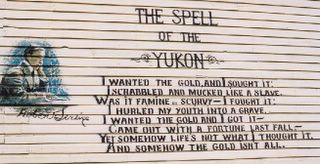
(Click on the text to enlarge it)
Robert Service goes on to say:
No! There's the land. (Have you seen it?)
It's the cussedest land that I know,
From the big, dizzy mountains that screen it
To the deep, deathlike valleys below.
Some say God was tired when He made it;
Some say it's a fine land to shun;
Maybe, but there's some who would trade it
For no land on earth--and I'm one.
The summer--no sweeter was ever;
The sunshiny woods all athrill;
The grayling aleap in the river,
The bighorn asleep on the hill.
The strong life that never knows harness;
The wilds where the caribou call;
The freshness, the freedom, the farness--
O God! how I'm stuck on it all.
There's a land where the mountains are nameless,
And the rivers all run God knows where;
There are lives that are erring and aimless,
And deaths that just hang by a hair;
There are hardships that nobody reckons;
There are valleys unpeopled and still;
There's a land--oh, it beckons and beckons,
And I want to go back--and I will.
(These are only excerpts, but they are the parts that are most thrilling to me)
Probably the most famous piece written by Robert Service is "The Cremation of Sam McGee." The first 8 lines alone are enough to give you chills:
There are strange things done in the midnight sun
By the men who moil for gold;
The Arctic trails have their secret tales
That would make your blood run cold;
The Northern Lights have seen queer sights,
But the queerest they ever did see
Was that night on the marge of Lake Lebarge
I cremated Sam McGee.

Sunday, May 01, 2005
A beautiful and exciting city . . .
Subscribe to:
Comments (Atom)




